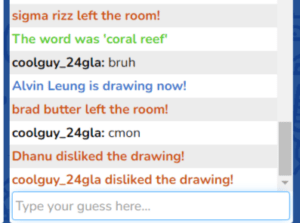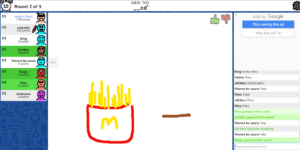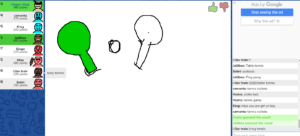For the critical play, I played Skribbl.io, an online multiplayer game created by ticedev and playable by adolescents and above (based on having to guess sometimes complex words and based on the harsh content introduced by other players in the game). Skribbl.io is an interesting example of a “judging” game because it does not include a directed, formal voting or judging session like most judging games but rather has a guessing format and a more implicit “judging” experience where other players express their dislike or satisfaction with the drawings being produced, motivating users to be creative and accurate in their artistic creations. Group dynamics in Skribbl.io varied greatly based on the match that you were placed in. Often judging led to anti-fellowship as people rarely gave props to users who did a good job creating their drawings but often expressed feelings of discontent when users did “a bad job” by pressing the dislike button or sending rude messages in the chat. I argue that the implicit judging aspect of the game had less impact on group dynamics of the game than on individual satisfaction and that group dynamics and relationships were more affected by the guessing aspect of Skribbl.io.
Firstly, I will address the effects of judging in the game on group dynamics. In Skribbl.io, a mechanic that exists is being able to include both guesses and commentary in a chat feature as well as being able to click the thumbs up + down button when someone is drawing. These are very prominent features on the screen and the only way to interact with other people when it’s not your turn to draw which leads to them being used often. However, because Skribbl.io allows for anonymous play (another mechanic is a leaderboard where everyone has fake names and cartoon avatars), the way that these features are interacted with can be very negative. For example, in most of my games, when someone was drawing slowly or when their drawing was unclear, they were very quick to get judged and berated by other players, with people often saying things like “what is that,” “that sucks,” and “bad”. This led to anti-fellowship. In some ways, this anti-fellowship actually made me more motivated when it became my turn to draw because I wanted to do a very good job at representing my word in order to avoid judgment from other players in the game. I felt successful and very validated when I made it through a drawing without other players sending any negative comments or thumbs-down messages and instead successfully being able to guess the word I was trying to represent. I found myself putting a lot of effort, concentration, and artistry into my drawings because of the implicit judging aspect of Skribbl.io even though I was trying to impress complete strangers who I could not see. The chat sometimes also sparked conversation between players, but it was rare for this conversation to signal any type of deep interaction rather than oftentimes inappropriate comments. In some ways, this added to the random, sporadic feel of the game, but it was often very toxic.

I argue that the true fun of the game and some of the important group dynamics did not come from the judging itself but rather from mechanics like the time limit and the fact that you could see other people’s guesses + success in the chat. Every round was a race to see who could guess the secret word the fastest. Because you could see what others had guessed in the chat, could see how many people had already guessed the word correctly, and could see the clock ticking, a sense of intense competition was created where I found myself rushing to put in guesses to try and beat everybody else. You could see this from other players as well as they started guessing immediately when a player’s turn began and spammed guesses into the chat, sometimes even taking cues from failed guesses from other players to try and beat them. This created a challenge, discovery, and anti-fellowship aesthetics as everyone discovered more information gradually through the chat + drawing and were challenged by the timer and successful guess notifications in the chat to beat out other players as quickly as possible in order to gain more points (since points decreased as more people guessed correctly).

[example of being able to see other people’s guesses + correct guesses]

[example of people piggybacking off of each other’s guesses and some odd conversation in the chat]
In terms of places for improvement, I feel that the type of group interactions in the game can be improved. This game is very similar to Pictionary but differs in the fact that everyone is playing individually and that everyone in the game is anonymous. I think this combination leads to poor-quality interactions in the chat and through the thumbs-up/down mechanic. I feel that a way to increase fellowship and improve group dynamics may be to better mimic the partner/group play in Pictionary so that users feel a larger motivation to feel connected and act cordially with at least some of the other players. The creator of the game might ask: How do other anonymous online games work to create rapport among players and reduce negative interactions?



